Organisational Behaviour (Unit 12) Report: Influence Analysis
VerifiedAdded on 2021/09/18
|5
|1240
|138
Report
AI Summary
This report provides a comprehensive analysis of organisational behaviour, focusing on the influence of culture, politics, and power on individual and team dynamics. It explores various motivational theories, including content and process theories, and their implications for management and leadership. The report examines different types of organisational teams, team dynamics, and the impact of technology on teamwork. Furthermore, it applies concepts and philosophies of organisational behaviour to a given business situation, considering concepts like perception, individual differences, and ethics. The report also covers conflict resolution, team development theories, and contemporary barriers to effective behaviour, providing a well-rounded understanding of organisational behaviour principles.
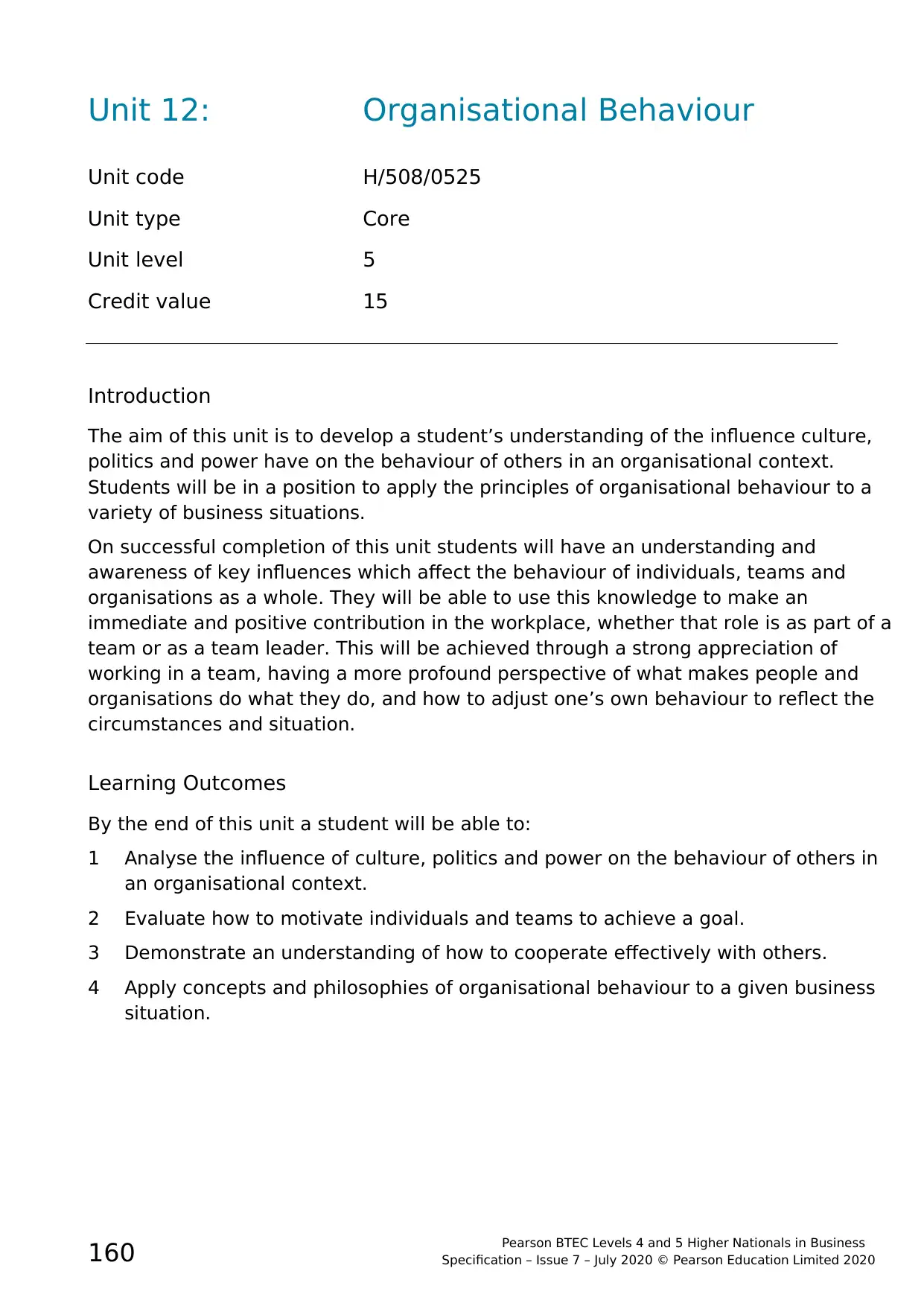
Pearson BTEC Levels 4 and 5 Higher Nationals in Business
Specification – Issue 7 – July 2020 © Pearson Education Limited 2020160
Unit 12: Organisational Behaviour
Unit code H/508/0525
Unit type Core
Unit level 5
Credit value 15
Introduction
The aim of this unit is to develop a student’s understanding of the influence culture,
politics and power have on the behaviour of others in an organisational context.
Students will be in a position to apply the principles of organisational behaviour to a
variety of business situations.
On successful completion of this unit students will have an understanding and
awareness of key influences which affect the behaviour of individuals, teams and
organisations as a whole. They will be able to use this knowledge to make an
immediate and positive contribution in the workplace, whether that role is as part of a
team or as a team leader. This will be achieved through a strong appreciation of
working in a team, having a more profound perspective of what makes people and
organisations do what they do, and how to adjust one’s own behaviour to reflect the
circumstances and situation.
Learning Outcomes
By the end of this unit a student will be able to:
1 Analyse the influence of culture, politics and power on the behaviour of others in
an organisational context.
2 Evaluate how to motivate individuals and teams to achieve a goal.
3 Demonstrate an understanding of how to cooperate effectively with others.
4 Apply concepts and philosophies of organisational behaviour to a given business
situation.
Specification – Issue 7 – July 2020 © Pearson Education Limited 2020160
Unit 12: Organisational Behaviour
Unit code H/508/0525
Unit type Core
Unit level 5
Credit value 15
Introduction
The aim of this unit is to develop a student’s understanding of the influence culture,
politics and power have on the behaviour of others in an organisational context.
Students will be in a position to apply the principles of organisational behaviour to a
variety of business situations.
On successful completion of this unit students will have an understanding and
awareness of key influences which affect the behaviour of individuals, teams and
organisations as a whole. They will be able to use this knowledge to make an
immediate and positive contribution in the workplace, whether that role is as part of a
team or as a team leader. This will be achieved through a strong appreciation of
working in a team, having a more profound perspective of what makes people and
organisations do what they do, and how to adjust one’s own behaviour to reflect the
circumstances and situation.
Learning Outcomes
By the end of this unit a student will be able to:
1 Analyse the influence of culture, politics and power on the behaviour of others in
an organisational context.
2 Evaluate how to motivate individuals and teams to achieve a goal.
3 Demonstrate an understanding of how to cooperate effectively with others.
4 Apply concepts and philosophies of organisational behaviour to a given business
situation.
Paraphrase This Document
Need a fresh take? Get an instant paraphrase of this document with our AI Paraphraser
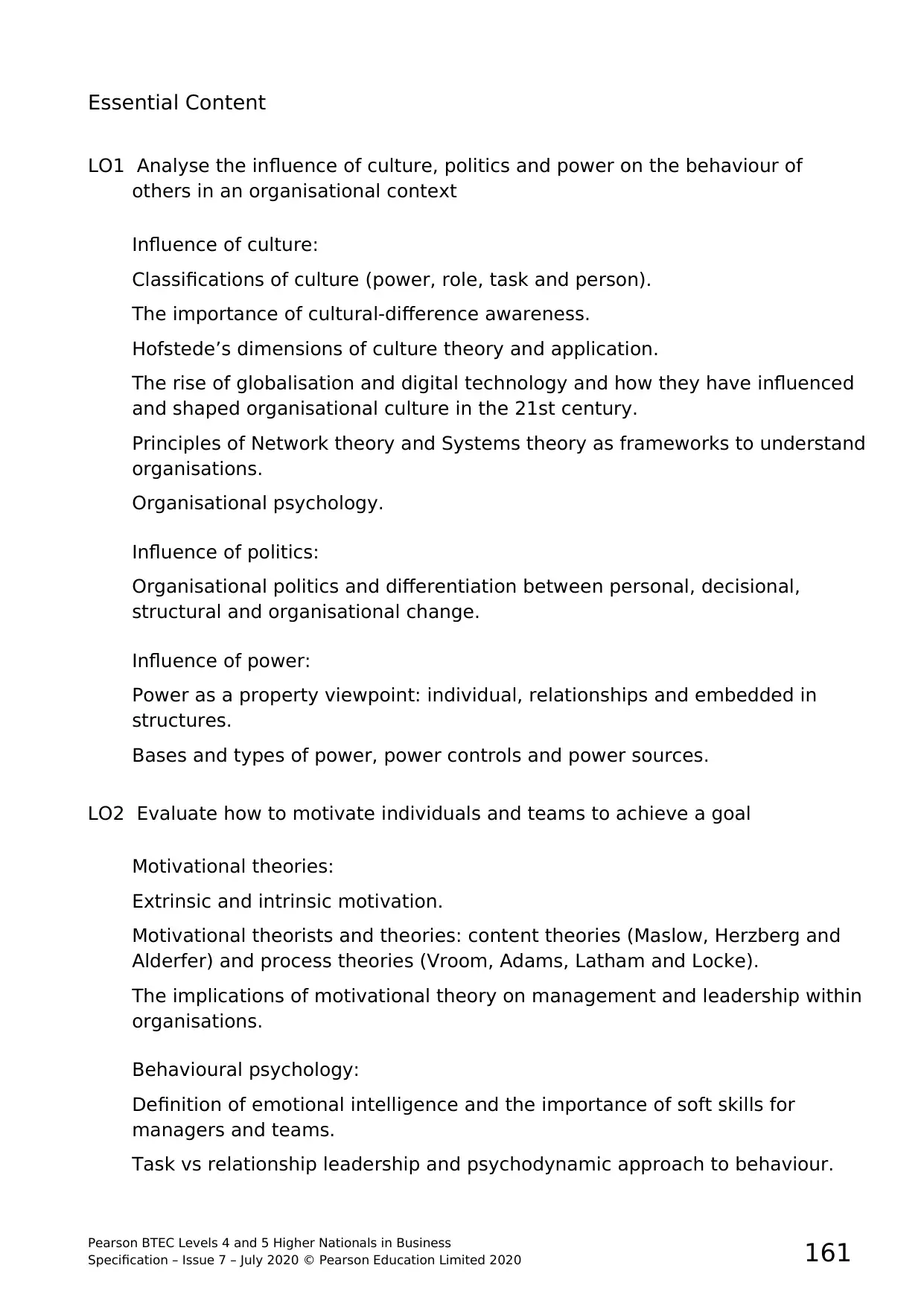
Pearson BTEC Levels 4 and 5 Higher Nationals in Business
Specification – Issue 7 – July 2020 © Pearson Education Limited 2020 161
Essential Content
LO1 Analyse the influence of culture, politics and power on the behaviour of
others in an organisational context
Influence of culture:
Classifications of culture (power, role, task and person).
The importance of cultural-difference awareness.
Hofstede’s dimensions of culture theory and application.
The rise of globalisation and digital technology and how they have influenced
and shaped organisational culture in the 21st century.
Principles of Network theory and Systems theory as frameworks to understand
organisations.
Organisational psychology.
Influence of politics:
Organisational politics and differentiation between personal, decisional,
structural and organisational change.
Influence of power:
Power as a property viewpoint: individual, relationships and embedded in
structures.
Bases and types of power, power controls and power sources.
LO2 Evaluate how to motivate individuals and teams to achieve a goal
Motivational theories:
Extrinsic and intrinsic motivation.
Motivational theorists and theories: content theories (Maslow, Herzberg and
Alderfer) and process theories (Vroom, Adams, Latham and Locke).
The implications of motivational theory on management and leadership within
organisations.
Behavioural psychology:
Definition of emotional intelligence and the importance of soft skills for
managers and teams.
Task vs relationship leadership and psychodynamic approach to behaviour.
Specification – Issue 7 – July 2020 © Pearson Education Limited 2020 161
Essential Content
LO1 Analyse the influence of culture, politics and power on the behaviour of
others in an organisational context
Influence of culture:
Classifications of culture (power, role, task and person).
The importance of cultural-difference awareness.
Hofstede’s dimensions of culture theory and application.
The rise of globalisation and digital technology and how they have influenced
and shaped organisational culture in the 21st century.
Principles of Network theory and Systems theory as frameworks to understand
organisations.
Organisational psychology.
Influence of politics:
Organisational politics and differentiation between personal, decisional,
structural and organisational change.
Influence of power:
Power as a property viewpoint: individual, relationships and embedded in
structures.
Bases and types of power, power controls and power sources.
LO2 Evaluate how to motivate individuals and teams to achieve a goal
Motivational theories:
Extrinsic and intrinsic motivation.
Motivational theorists and theories: content theories (Maslow, Herzberg and
Alderfer) and process theories (Vroom, Adams, Latham and Locke).
The implications of motivational theory on management and leadership within
organisations.
Behavioural psychology:
Definition of emotional intelligence and the importance of soft skills for
managers and teams.
Task vs relationship leadership and psychodynamic approach to behaviour.
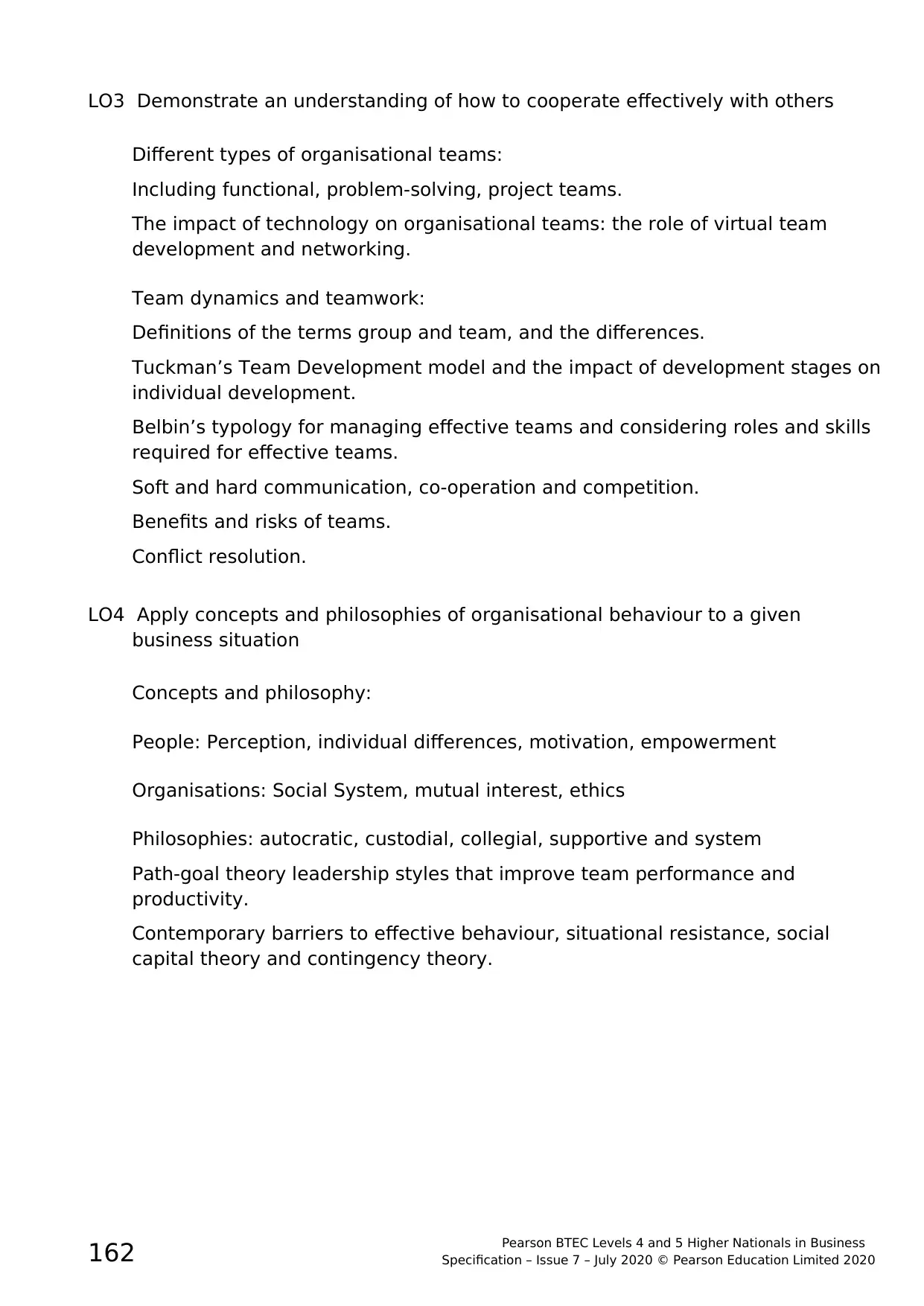
Pearson BTEC Levels 4 and 5 Higher Nationals in Business
Specification – Issue 7 – July 2020 © Pearson Education Limited 2020162
LO3 Demonstrate an understanding of how to cooperate effectively with others
Different types of organisational teams:
Including functional, problem-solving, project teams.
The impact of technology on organisational teams: the role of virtual team
development and networking.
Team dynamics and teamwork:
Definitions of the terms group and team, and the differences.
Tuckman’s Team Development model and the impact of development stages on
individual development.
Belbin’s typology for managing effective teams and considering roles and skills
required for effective teams.
Soft and hard communication, co-operation and competition.
Benefits and risks of teams.
Conflict resolution.
LO4 Apply concepts and philosophies of organisational behaviour to a given
business situation
Concepts and philosophy:
People: Perception, individual differences, motivation, empowerment
Organisations: Social System, mutual interest, ethics
Philosophies: autocratic, custodial, collegial, supportive and system
Path-goal theory leadership styles that improve team performance and
productivity.
Contemporary barriers to effective behaviour, situational resistance, social
capital theory and contingency theory.
Specification – Issue 7 – July 2020 © Pearson Education Limited 2020162
LO3 Demonstrate an understanding of how to cooperate effectively with others
Different types of organisational teams:
Including functional, problem-solving, project teams.
The impact of technology on organisational teams: the role of virtual team
development and networking.
Team dynamics and teamwork:
Definitions of the terms group and team, and the differences.
Tuckman’s Team Development model and the impact of development stages on
individual development.
Belbin’s typology for managing effective teams and considering roles and skills
required for effective teams.
Soft and hard communication, co-operation and competition.
Benefits and risks of teams.
Conflict resolution.
LO4 Apply concepts and philosophies of organisational behaviour to a given
business situation
Concepts and philosophy:
People: Perception, individual differences, motivation, empowerment
Organisations: Social System, mutual interest, ethics
Philosophies: autocratic, custodial, collegial, supportive and system
Path-goal theory leadership styles that improve team performance and
productivity.
Contemporary barriers to effective behaviour, situational resistance, social
capital theory and contingency theory.
⊘ This is a preview!⊘
Do you want full access?
Subscribe today to unlock all pages.

Trusted by 1+ million students worldwide
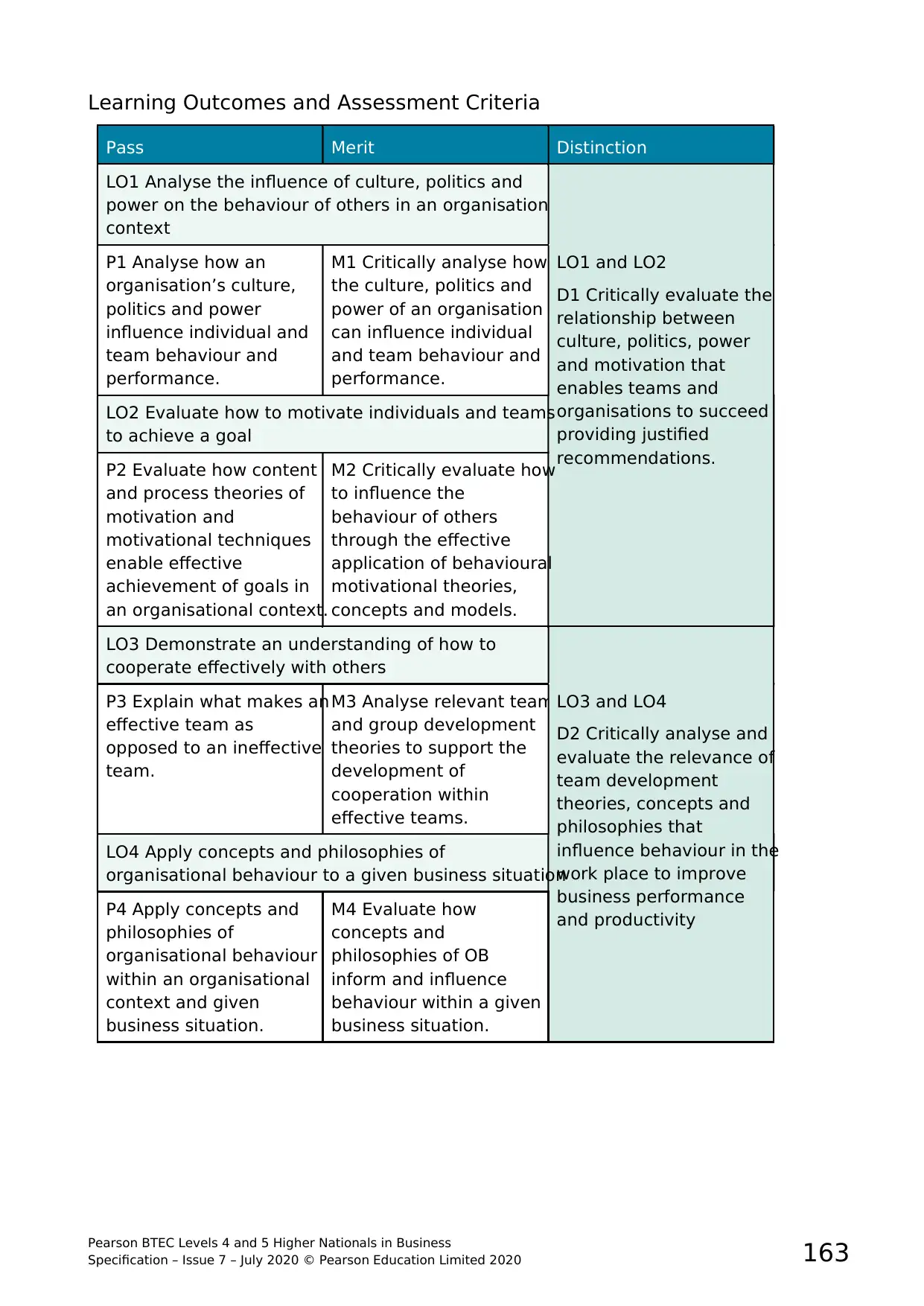
Pearson BTEC Levels 4 and 5 Higher Nationals in Business
Specification – Issue 7 – July 2020 © Pearson Education Limited 2020 163
Learning Outcomes and Assessment Criteria
Pass Merit Distinction
LO1 Analyse the influence of culture, politics and
power on the behaviour of others in an organisational
context
P1 Analyse how an
organisation’s culture,
politics and power
influence individual and
team behaviour and
performance.
M1 Critically analyse how
the culture, politics and
power of an organisation
can influence individual
and team behaviour and
performance.
LO1 and LO2
D1 Critically evaluate the
relationship between
culture, politics, power
and motivation that
enables teams and
organisations to succeed
providing justified
recommendations.
LO2 Evaluate how to motivate individuals and teams
to achieve a goal
P2 Evaluate how content
and process theories of
motivation and
motivational techniques
enable effective
achievement of goals in
an organisational context.
M2 Critically evaluate how
to influence the
behaviour of others
through the effective
application of behavioural
motivational theories,
concepts and models.
LO3 Demonstrate an understanding of how to
cooperate effectively with others
P3 Explain what makes an
effective team as
opposed to an ineffective
team.
M3 Analyse relevant team
and group development
theories to support the
development of
cooperation within
effective teams.
LO3 and LO4
D2 Critically analyse and
evaluate the relevance of
team development
theories, concepts and
philosophies that
influence behaviour in the
work place to improve
business performance
and productivity
LO4 Apply concepts and philosophies of
organisational behaviour to a given business situation
P4 Apply concepts and
philosophies of
organisational behaviour
within an organisational
context and given
business situation.
M4 Evaluate how
concepts and
philosophies of OB
inform and influence
behaviour within a given
business situation.
Specification – Issue 7 – July 2020 © Pearson Education Limited 2020 163
Learning Outcomes and Assessment Criteria
Pass Merit Distinction
LO1 Analyse the influence of culture, politics and
power on the behaviour of others in an organisational
context
P1 Analyse how an
organisation’s culture,
politics and power
influence individual and
team behaviour and
performance.
M1 Critically analyse how
the culture, politics and
power of an organisation
can influence individual
and team behaviour and
performance.
LO1 and LO2
D1 Critically evaluate the
relationship between
culture, politics, power
and motivation that
enables teams and
organisations to succeed
providing justified
recommendations.
LO2 Evaluate how to motivate individuals and teams
to achieve a goal
P2 Evaluate how content
and process theories of
motivation and
motivational techniques
enable effective
achievement of goals in
an organisational context.
M2 Critically evaluate how
to influence the
behaviour of others
through the effective
application of behavioural
motivational theories,
concepts and models.
LO3 Demonstrate an understanding of how to
cooperate effectively with others
P3 Explain what makes an
effective team as
opposed to an ineffective
team.
M3 Analyse relevant team
and group development
theories to support the
development of
cooperation within
effective teams.
LO3 and LO4
D2 Critically analyse and
evaluate the relevance of
team development
theories, concepts and
philosophies that
influence behaviour in the
work place to improve
business performance
and productivity
LO4 Apply concepts and philosophies of
organisational behaviour to a given business situation
P4 Apply concepts and
philosophies of
organisational behaviour
within an organisational
context and given
business situation.
M4 Evaluate how
concepts and
philosophies of OB
inform and influence
behaviour within a given
business situation.
Paraphrase This Document
Need a fresh take? Get an instant paraphrase of this document with our AI Paraphraser
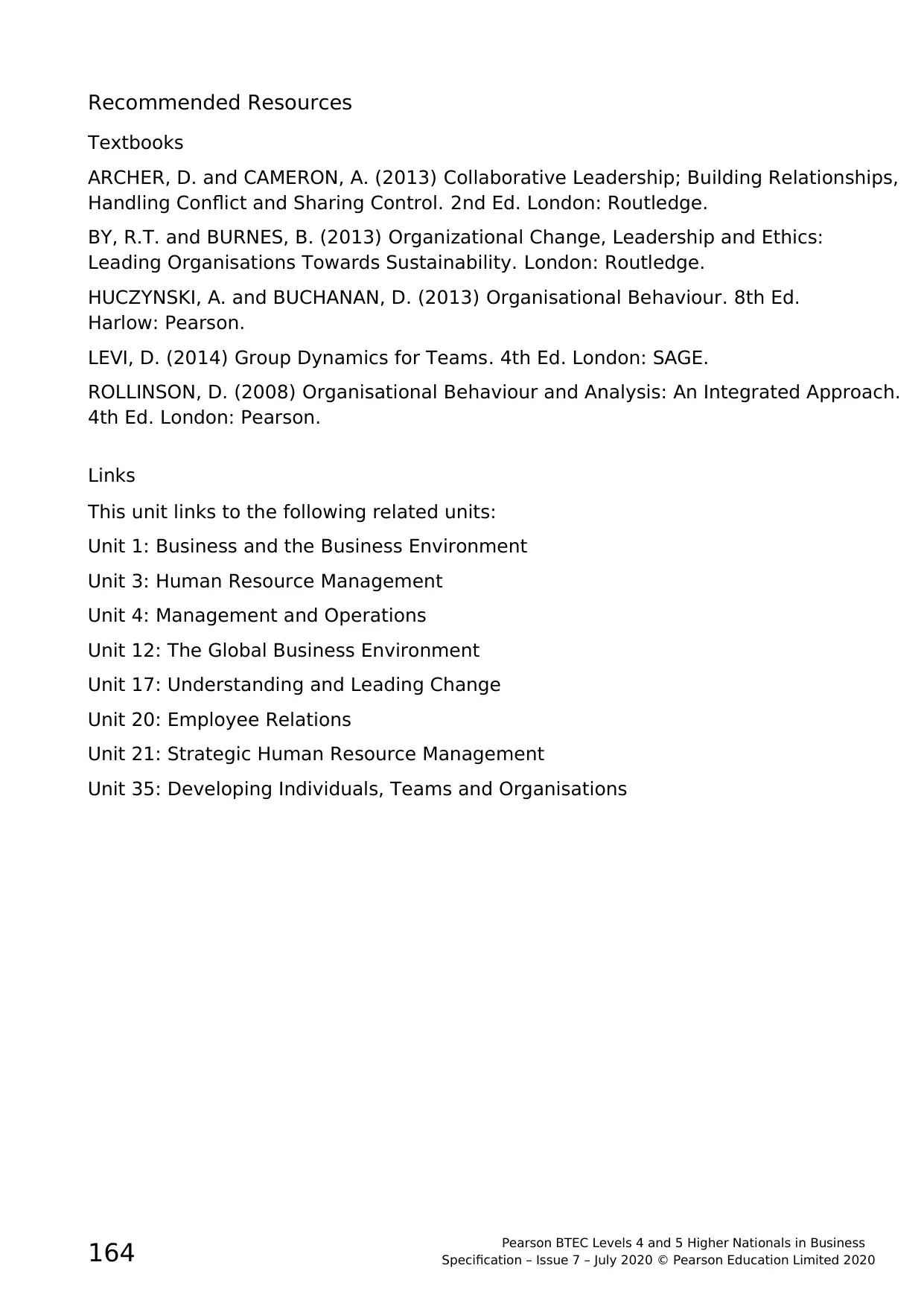
Pearson BTEC Levels 4 and 5 Higher Nationals in Business
Specification – Issue 7 – July 2020 © Pearson Education Limited 2020164
Recommended Resources
Textbooks
ARCHER, D. and CAMERON, A. (2013) Collaborative Leadership; Building Relationships,
Handling Conflict and Sharing Control. 2nd Ed. London: Routledge.
BY, R.T. and BURNES, B. (2013) Organizational Change, Leadership and Ethics:
Leading Organisations Towards Sustainability. London: Routledge.
HUCZYNSKI, A. and BUCHANAN, D. (2013) Organisational Behaviour. 8th Ed.
Harlow: Pearson.
LEVI, D. (2014) Group Dynamics for Teams. 4th Ed. London: SAGE.
ROLLINSON, D. (2008) Organisational Behaviour and Analysis: An Integrated Approach.
4th Ed. London: Pearson.
Links
This unit links to the following related units:
Unit 1: Business and the Business Environment
Unit 3: Human Resource Management
Unit 4: Management and Operations
Unit 12: The Global Business Environment
Unit 17: Understanding and Leading Change
Unit 20: Employee Relations
Unit 21: Strategic Human Resource Management
Unit 35: Developing Individuals, Teams and Organisations
Specification – Issue 7 – July 2020 © Pearson Education Limited 2020164
Recommended Resources
Textbooks
ARCHER, D. and CAMERON, A. (2013) Collaborative Leadership; Building Relationships,
Handling Conflict and Sharing Control. 2nd Ed. London: Routledge.
BY, R.T. and BURNES, B. (2013) Organizational Change, Leadership and Ethics:
Leading Organisations Towards Sustainability. London: Routledge.
HUCZYNSKI, A. and BUCHANAN, D. (2013) Organisational Behaviour. 8th Ed.
Harlow: Pearson.
LEVI, D. (2014) Group Dynamics for Teams. 4th Ed. London: SAGE.
ROLLINSON, D. (2008) Organisational Behaviour and Analysis: An Integrated Approach.
4th Ed. London: Pearson.
Links
This unit links to the following related units:
Unit 1: Business and the Business Environment
Unit 3: Human Resource Management
Unit 4: Management and Operations
Unit 12: The Global Business Environment
Unit 17: Understanding and Leading Change
Unit 20: Employee Relations
Unit 21: Strategic Human Resource Management
Unit 35: Developing Individuals, Teams and Organisations
1 out of 5
Related Documents
Your All-in-One AI-Powered Toolkit for Academic Success.
+13062052269
info@desklib.com
Available 24*7 on WhatsApp / Email
![[object Object]](/_next/static/media/star-bottom.7253800d.svg)
Unlock your academic potential
Copyright © 2020–2026 A2Z Services. All Rights Reserved. Developed and managed by ZUCOL.





